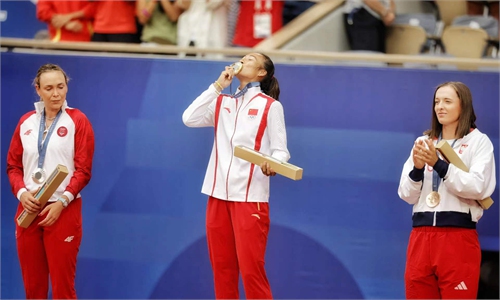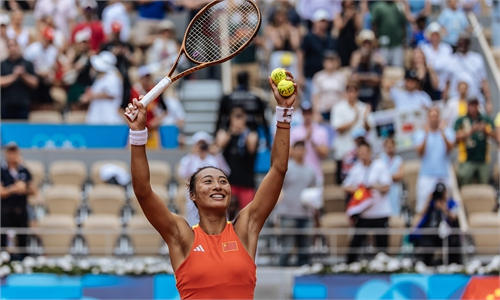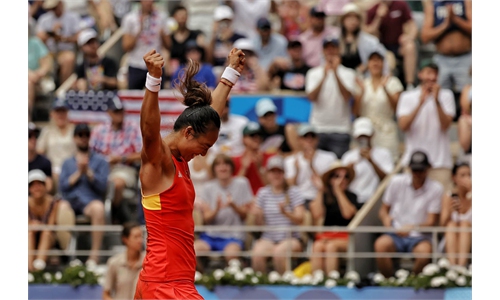ARTS / CULTURE & LEISURE
Secret behind how Hubei Province produces tennis ‘queens’
Champions’ starting point
In the early morning light of Jingmen, Central China's Hubei Province, the city hums with the rhythmic sound of tennis balls colliding rackets.
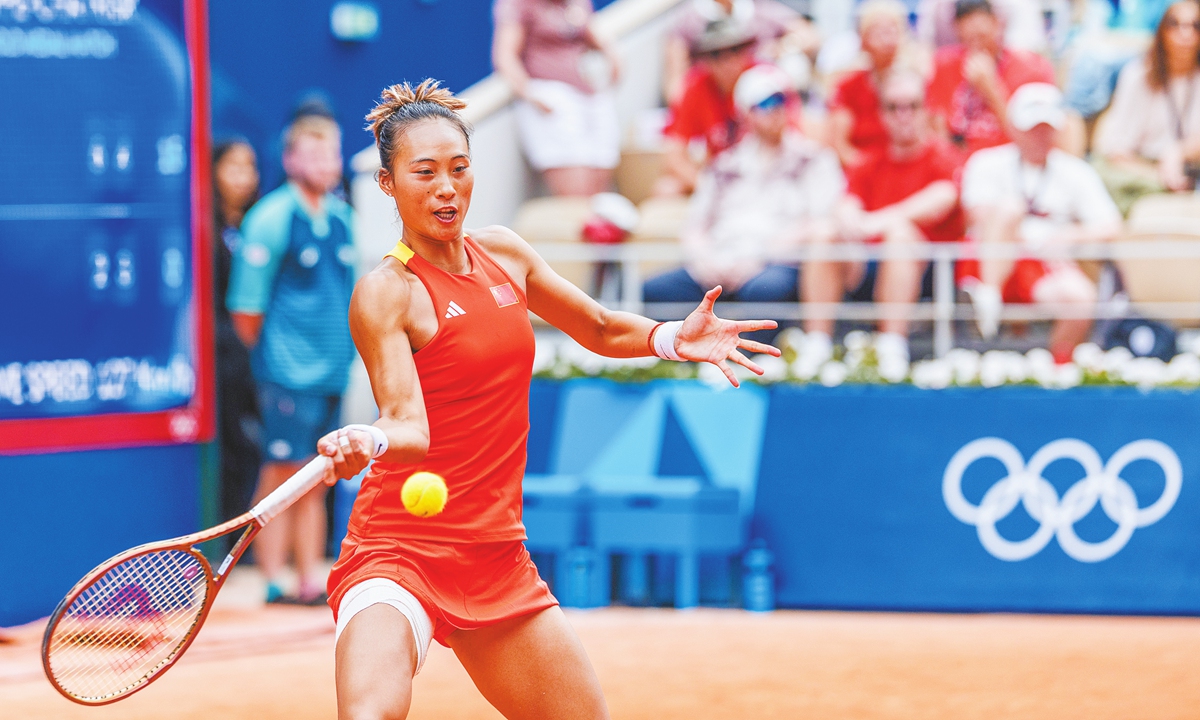
"Hubei's success in tennis isn't just a coincidence or a discipline, but it's a tradition and an inheritance," Luo Le, a sports industry scholar at the Beijing University of Chemical Technology told the Global Times.
The accessibility of tennis courts - within a 15-minute walk - may explain why Hubei has nurtured so many tennis prodigies.
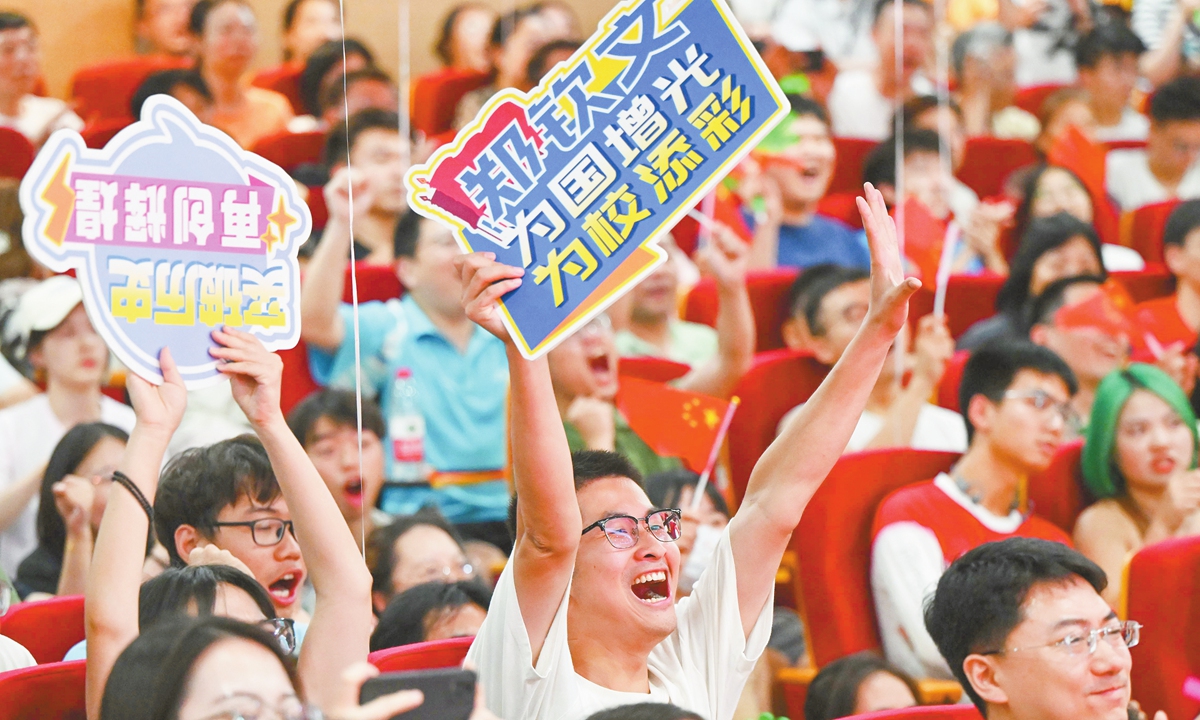
August 3 is a day that many Chinese tennis fans will never forget. Zheng Qinwen, nicknamed "Queen Wen," a 21-year-old Chinese tennis player from Hubei, clinched China's first-ever gold medal in women's singles tennis at the Paris 2024 Olympics. She also became the first Asian player to reach the top of the podium in women's singles tennis at the Olympics.
Zheng follows in the footsteps of another legendary Hubei tennis player, Li Na. With two Grand Slam titles and a personal best world ranking of No.2 in women's tennis, Li transformed tennis from a niche sport to a mainstream passion in China, achieving unprecedented success for an Asian player.
The emergence of Li and Zheng as world champions begs the question: Why are tennis talent emerging from Hubei?
The region's deep-rooted passion for the sport dates back to the 1920s when tennis became part of the Hubei Provincial Games, which took the lead in including women in competitions, as reported by CCTV news.
With excellent infrastructure and a legacy of accomplished players returning as coaches, Hubei has become a breeding ground for tennis talent.
Names like Li Ting, Zhu Benqiang and Pan Bing are all synonymous with Hubei's tennis legacy. After retiring, Pan served as the head coach of the Hubei Provincial Tennis Team and the Chinese Women's National Tennis Team, contributing to the growth of future champions.
"Many outstanding players from Hubei returned as coaches. Along with well-established infrastructure, these are the main reasons for Hubei's success," Liu Mingyi, chief expert at the China Youth Sports and Physical Education Integration Public Policy Research Center and professor at Wuhan Sports University told the Global Times.
Liu noted that even 20 years ago, when tennis wasn't as popular, Wuhan in Hubei already boasted many tennis courts, including those at the Xinhua Road Stadium and Wuhan Sports University. "There were even indoor courts for training when weather was not good. The infrastructure was already very well-developed back then," Liu added.
He also highlighted the standardization and systematization of coaching in Hubei as key factors in the region's tennis success.
One of the most influential figures in this system is Yu Liqiao, who has shaped multiple generations of players since 1973, including both Li and Zheng. Under Yu's rigorous training, these athletes grew into world-class competitors. In Li's autobiography My Life, she recalls the intense training under Yu's guidance, which, though harsh, was emblematic of the times and also crucial to her success.
Zheng, who also trained under Yu, was later advanced to Potter's Wheel, where she honed her skills under top coaches, including Carlos Rodriguez. While there, she got the chance to have international tennis exchanges.
After the match, Zheng also reflected on the importance of "passing the torch."
"If today's victory can inspire more children to dream of playing tennis, then everything is worth it. I hope that in 10 or 20 years, you can stand on this stage," Zheng said.
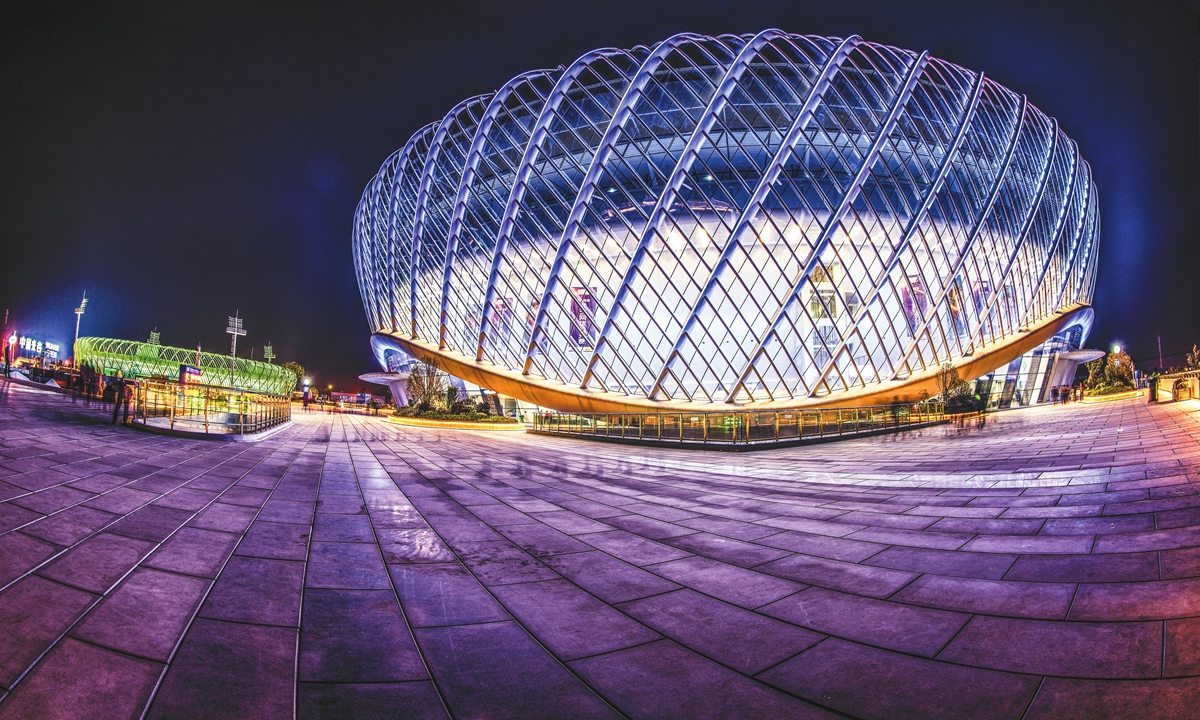
Indeed, aside from tennis, many regions in China have developed distinctive features in the sports field, with regional characteristics remaining quite evident, especially based on economic and natural conditions. Each region utilizes its strengths, taking advantage of its training system and resources.
Looking back at each Olympic Games, many sports have formed "champion systems" in some specific Chinese provinces, such as table tennis in Northeast China's Liaoning Province, diving in the South China's Guangdong Province, and swimming in East China's Zhejiang Province.
"Local governments discover and nurture young talent, providing them
with training platforms and placing them in environments with suitable economic and training conditions. This is a comprehensive training system," Liu noted.
Having produced legends like Ma Lin, Ma Long, and Liu Shiwen, Liaoning Province is renowned for its dominance in table tennis. The city of Anshan, recognized by the General Administration of Sport of China, has become a crucial hub for table tennis, with a dedicated training center and the highest number of registered coaches in the country.
In Guangdong, particularly in Zhanjiang, the "Hometown of Diving," in proximity to the sea, offers an unparalleled environment for water sports.
It was here that Quan Hongchan, who was discovered at a rural elementary school by coach Chen Huaming, began her journey in diving. She then entered Zhanjiang Sports School at the age of 7 to start diving training.
Once talented individuals are identified, the school recommends them to higher-level teams. Chen recommended Quan to the Guangdong provincial diving team by sending video footage. She went on to win gold in the women's 10m platform event at the Paris 2024 Olympics, showcasing the success of Guangdong's comprehensive training system.
China widely organizes various sports events based on this talent identification and regional training system.
"The development of sports is indeed complex, not just limited to basic education facilities. It requires frequent competitions, guarantees, and a comprehensive training environment," Liu said.
"Now the system for training young athletes has changed as it combines the state-sponsored and market-oriented systems."

Chinese tennis player Zheng Qinwen plays in women's singles gold medal match against Donna Vekic of Croatia at the Paris 2024 Olympic Games in France on August 3, 2024. Photo: Li Hao/GT
Residents come out of their homes to watch those on the court without a single complaint about the noise. In this small city with a population of approximately 600,000, there are more than 340 high-standard tennis courts and over 100,000 tennis enthusiasts."Hubei's success in tennis isn't just a coincidence or a discipline, but it's a tradition and an inheritance," Luo Le, a sports industry scholar at the Beijing University of Chemical Technology told the Global Times.
The accessibility of tennis courts - within a 15-minute walk - may explain why Hubei has nurtured so many tennis prodigies.

More than 300 teachers and students cheer for Zheng Qinwen in Huazhong University of Science and Technology in Wuhan, Central China's Hubei Province, on August 3, 2024. Photo: VCG
Rising starAugust 3 is a day that many Chinese tennis fans will never forget. Zheng Qinwen, nicknamed "Queen Wen," a 21-year-old Chinese tennis player from Hubei, clinched China's first-ever gold medal in women's singles tennis at the Paris 2024 Olympics. She also became the first Asian player to reach the top of the podium in women's singles tennis at the Olympics.
Zheng follows in the footsteps of another legendary Hubei tennis player, Li Na. With two Grand Slam titles and a personal best world ranking of No.2 in women's tennis, Li transformed tennis from a niche sport to a mainstream passion in China, achieving unprecedented success for an Asian player.
The emergence of Li and Zheng as world champions begs the question: Why are tennis talent emerging from Hubei?
The region's deep-rooted passion for the sport dates back to the 1920s when tennis became part of the Hubei Provincial Games, which took the lead in including women in competitions, as reported by CCTV news.
With excellent infrastructure and a legacy of accomplished players returning as coaches, Hubei has become a breeding ground for tennis talent.
Names like Li Ting, Zhu Benqiang and Pan Bing are all synonymous with Hubei's tennis legacy. After retiring, Pan served as the head coach of the Hubei Provincial Tennis Team and the Chinese Women's National Tennis Team, contributing to the growth of future champions.
"Many outstanding players from Hubei returned as coaches. Along with well-established infrastructure, these are the main reasons for Hubei's success," Liu Mingyi, chief expert at the China Youth Sports and Physical Education Integration Public Policy Research Center and professor at Wuhan Sports University told the Global Times.
Liu noted that even 20 years ago, when tennis wasn't as popular, Wuhan in Hubei already boasted many tennis courts, including those at the Xinhua Road Stadium and Wuhan Sports University. "There were even indoor courts for training when weather was not good. The infrastructure was already very well-developed back then," Liu added.
He also highlighted the standardization and systematization of coaching in Hubei as key factors in the region's tennis success.
One of the most influential figures in this system is Yu Liqiao, who has shaped multiple generations of players since 1973, including both Li and Zheng. Under Yu's rigorous training, these athletes grew into world-class competitors. In Li's autobiography My Life, she recalls the intense training under Yu's guidance, which, though harsh, was emblematic of the times and also crucial to her success.
Zheng, who also trained under Yu, was later advanced to Potter's Wheel, where she honed her skills under top coaches, including Carlos Rodriguez. While there, she got the chance to have international tennis exchanges.
After the match, Zheng also reflected on the importance of "passing the torch."
"If today's victory can inspire more children to dream of playing tennis, then everything is worth it. I hope that in 10 or 20 years, you can stand on this stage," Zheng said.

A night view of the Optics Valley International Tennis Center in Wuhan, Central China's Hubei Province, on August 3, 2024 Photos: VCG
Nurturing potentialIndeed, aside from tennis, many regions in China have developed distinctive features in the sports field, with regional characteristics remaining quite evident, especially based on economic and natural conditions. Each region utilizes its strengths, taking advantage of its training system and resources.
Looking back at each Olympic Games, many sports have formed "champion systems" in some specific Chinese provinces, such as table tennis in Northeast China's Liaoning Province, diving in the South China's Guangdong Province, and swimming in East China's Zhejiang Province.
"Local governments discover and nurture young talent, providing them
with training platforms and placing them in environments with suitable economic and training conditions. This is a comprehensive training system," Liu noted.
Having produced legends like Ma Lin, Ma Long, and Liu Shiwen, Liaoning Province is renowned for its dominance in table tennis. The city of Anshan, recognized by the General Administration of Sport of China, has become a crucial hub for table tennis, with a dedicated training center and the highest number of registered coaches in the country.
In Guangdong, particularly in Zhanjiang, the "Hometown of Diving," in proximity to the sea, offers an unparalleled environment for water sports.
It was here that Quan Hongchan, who was discovered at a rural elementary school by coach Chen Huaming, began her journey in diving. She then entered Zhanjiang Sports School at the age of 7 to start diving training.
Once talented individuals are identified, the school recommends them to higher-level teams. Chen recommended Quan to the Guangdong provincial diving team by sending video footage. She went on to win gold in the women's 10m platform event at the Paris 2024 Olympics, showcasing the success of Guangdong's comprehensive training system.
China widely organizes various sports events based on this talent identification and regional training system.
"The development of sports is indeed complex, not just limited to basic education facilities. It requires frequent competitions, guarantees, and a comprehensive training environment," Liu said.
"Now the system for training young athletes has changed as it combines the state-sponsored and market-oriented systems."
